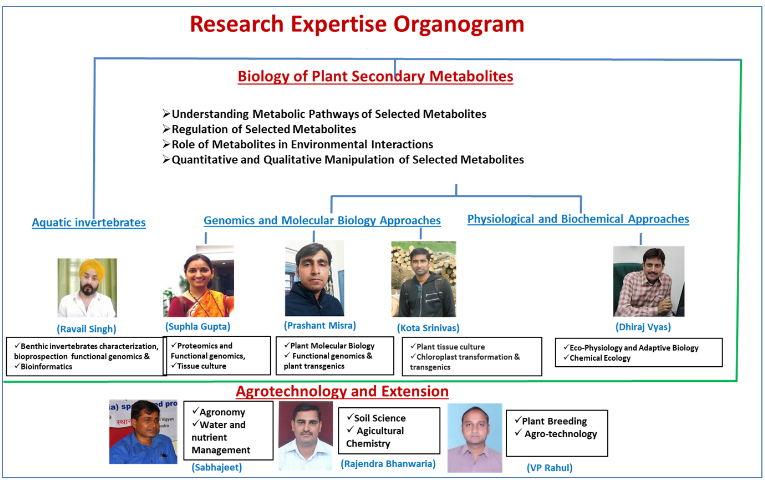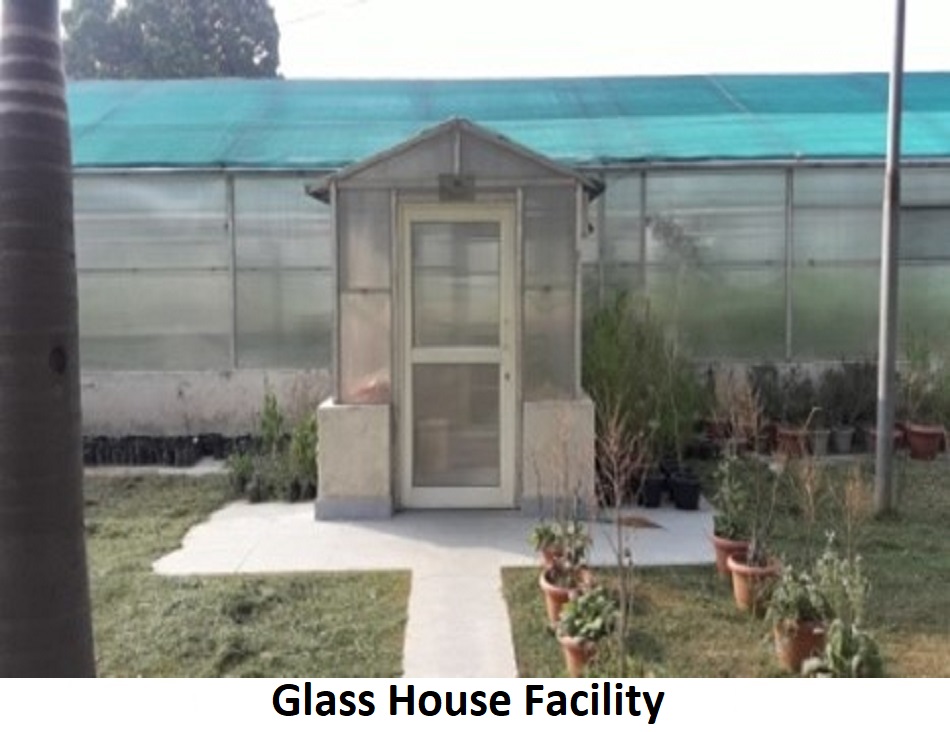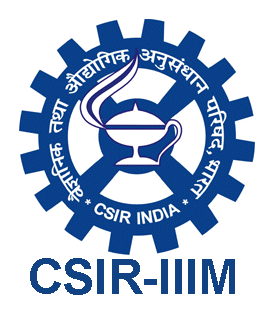Plant Sciences and Agrotechnology Division (PSA)

Plant Sciences division research spans both fundamental and applied aspects of these Medicinal and Aromatic Plants (MAPs). It involves various branches of biology such as taxonomy, genetics, ecology, ethnobotany, biochemistry, physiology, molecular biology, and computational biologyto study the complex biological aspects of Medicinal and Aromatic Plants (MAPs). With a mosaic of expertise in plant and agricultural sciences, the department upholds a legacy of conserving genetic resources across ecological regions and developing elite germplasm. Through a blend of conventional and modern approaches, the division has successfully bred varieties of MAPs that thrive across diverse regions of the country, contributing to substantial economic returns.
Matching with the current research trends, the division is harnessing the potential of cutting edge biochemical and molecular approaches to understand different biological processes and their environmental interactions. It is mainly in the area of understanding the regulation and engineering metabolic pathways of plant secondary metabolites.
Recently, in the societal arena the division has brought laurels by “Purple Revolution” under Aroma Mission, where the income of the farmers has increased multi-fold. In addition to its current endeavours, the division is expanding its scope to include the study of aquatic invertebrate fauna found in both freshwater and the marine deep ocean regions.








Vision:
- Center of Excellence: Strive to become a beacon of excellence in both basic and applied research on medicinal and aromatic plants, pushing the boundaries of scientific exploration.
- Rural Bio-Economy Empowerment: Empower rural communities through technological interventions in the medicinal and aromatic plant sector, fostering sustainable economic growth and prosperity.
Mission:
-
- Eco-Geographical Bioresource Documentation: Document the rich biodiversity of the Western Himalayan flora, preserving invaluable genetic resources for future generations.
- Conservation Initiatives: Implement comprehensive strategies for both in situ and ex situ conservation of selected Medicinal and Aromatic Plants (MAPs), safeguarding their genetic diversity and ecological significance.
- Promoting Cultivation: Encourage the cultivation of MAPs among rural communities, creating pathways for economic empowerment and sustainable livelihoods.
- Germplasm Development: Utilize conventional and cutting-edge biotechnological approaches to develop elite germplasm, enhancing the genetic potential of MAPs for future generations.
- Secondary Metabolite Pathway Elucidation: Unravel the intricate pathways involved in the biosynthesis of secondary metabolites, unlocking the therapeutic potential of medicinal plants.
- Environmental Interaction Exploration: Investigate the role of secondary metabolites in environmental interactions using a multidisciplinary approach encompassing physiology, biochemistry, molecular biology, and chemical ecology.
- Climate Change Resilience: Conduct studies on climate change resilience, identifying and cultivating plants with the potential to thrive in future environmental conditions, ensuring the sustainability of our natural resources.
- Aquatic Invertebrate Community Database: Establish a comprehensive inventory of the aquatic invertebrate communities in the marine and nearby freshwater regions of Jammu and Kashmir, unlocking the mysteries of these diverse ecosystems.
- Bioprospection Ventures: Dive into the depths of marine and freshwater realms to bioprospect for novel compounds and genetic resources, paving the way for groundbreaking discoveries in biotechnology and pharmaceuticals
Competencies:
-
- Surveys and Mapping: Conduct comprehensive surveys to map and identify plant resources in different ecological zones. Recently, mapping of benthic invertebrate fauna has been included.
- Resource Identification: Identify and collect quality raw materials, particularly plants, for the extraction of natural products and bioactive molecules, fostering sustainable practices.
- Agro Technologies Development: Develop innovative agro technologies to extend the cultivation of high-value medicinal and aromatic plants across diverse agro-climatic zones.
- Breeding Strategies: Implement strategic breeding methods to develop new, high-yielding varieties of Medicinal and Aromatic Plants (MAPs), enhancing agricultural productivity.
- Farm Planning and Management: Plan and manage farms meticulously, ensuring optimal utilization of resources and sustainable agricultural practices.
- Taxonomic Identification: Conduct taxonomic identification and validation of plants and crude drugs, preserving botanical diversity and ensuring accuracy in research. In addition to that characterisation of benthic invertebrate community from freshwater and marine region.
- Conservation Strategies: Implement in situ and ex situ conservation strategies to protect endangered plants, safeguarding biodiversity for future generations.
- Plant Tissue Culture Techniques: Utilize advanced techniques such as in vitro micropropagation for the propagation and conservation of plant species.
- Plant Physiology and Molecular Biology Tools: Employ plant physiology and molecular biology tools for understanding plant functioning and genetic manipulation, advancing research in gene expression and genome editing.
- Bioinformatics and Computational Biology: Utilize bioinformatics and computational biology tools for analyzing next-generation sequencing data, unraveling gene networks, and ecological modelling.
- Genome Mining of benthic invertebrates: Uncover genetically encoded metabolites within benthic invertebrate communities through genome mining.
- Soil Science and Agricultural Chemistry: Apply knowledge of soil science and agricultural chemistry to optimize soil health and agricultural productivity, ensuring sustainable agricultural practices.
Facility Janaki Ammal Herbarium:
- Rich Botanical Legacy: Home to over 24,200 specimens representing 3,265 species, the Janaki Ammal Herbarium serves as a cornerstone for botanical research.
- International Recognition: Recognized internationally and registered in the Index Herbarium at New York, USA, under the acronym RRLH, it is a trusted resource for plant authentication.
Herbal Drug Repository:
- Treasure Trove of Traditional Wisdom: With over 4,200 authenticated crude drug samples, this repository is a beacon of traditional herbal knowledge, accessible to practitioners, researchers, and industry alike.
Kisan Training Centre:
- Empowering Agriculture: Our training center imparts technical know-how to farmers, growers, and entrepreneurs, nurturing a skilled workforce for sustainable agricultural practices.
Experimental Farm:
- Plant source: Spanning 50 acres, our experimental farm at Chatha is a testament to our commitment to research and development in medicinal and aromatic plants.
Modern Research Facilities:
-
- Equipped for Innovation: Our well-equipped facilities provide a fertile ground for groundbreaking research on various aspects of plants, from tissue culture to controlled environment studies.
- Plant Tissue Culture Facility: To understand the potential of plant biotechnology, our tissue culture facility fosters the propagation and preservation of valuable plant species.
- Protected Growth Environments: From glass houses to poly houses and net houses, we provide optimal environments for plant growth and experimentation, ensuring the success of our research endeavors.
- Walk-in Plant Growth Chamber: Step into the future of plant research with our controlled environment chamber, where plants thrive under precisely regulated conditions, paving the way for scientific breakthroughs.
- Computational Lab Facility:Within our division, we are boasting the state-of-the-art computational resources dedicated to conducting intricate bioinformatic analyses of data generated from both plant and aquatic invertebrate research. With the advanced computational tools, we are paving the way to harness modern computation and machine learning techniques to understand the genomic mysteries concealed within the rich diversity of both plant and aquatic invertebrate organisms.
| Name | Designation |
| Dr. Dhiraj Vyas | Head & Sr. Principal Scientist |
| Dr. Suphla Gupta | Sr. Principal Scientist |
| Dr. Prashant Misra | Principal Scientist |
| Dr. Rajendra Bhanwaria |
Senior Scientist |
| Dr. Sabha Jeet | Senior Scientist |
| Dr. Vishva Prakash Rahul |
Senior Scientist |
| Dr. Ravail Singh |
Senior Scientist |
| Dr. Srinivas Kota |
Scientist |
| Dr. Manu Khajuria |
Scientist |
| Dr. Siya Ram Meena |
Senior Technical Officer(III) |
| Mr. Chandra Pal Singh |
Technical Officer |
| Mr. Rajendra Gochar |
Senior Technical Officer |
| Mr. Yadunandan Sen | Technical Officer |
| Mr. Rajinder Kumar Sharma | Technical Assistant |
| Mr. Akash Verma | Technical Assistant |
| Ms. Kiran Koul | Sr. Technician |
Multitasking/ Farm Staff
Mr. Mangal Das,MTS
Mr. Ashok Kumar, MTS
Mr. Bachan Lal, MTS
Ashok Kumar, Lab. Adtt.
Bachan Lal, MTS
Mr. Kuldip Kumar, Lab. Adtt.
Sodagar Lal, MTS
Kuldip Kumar, Lab. Adtt.
Ajit Ram, MTS
Karnel Chand, MTS
Surinder Kumar, MTS
Mission Projects and CSIR Funded Projects
| S.no | Project Title | Funding Agency | Project Leader |
| 1. | Aroma Mission project phase- III | CSIR | Dr. Suplha Gupta |
| 2. | CSIR-Phytopharma Mission | CSIR | Dr. Dhiraj Vyas |
| 3. | Diving into the deep ocean sea mounts for biodiversity, ecosystem functioning and mining of genetically encoded metabolites (GEMs) using a Combined OMICS approach (Deep Sea Mission) | Ministry of Earth Science (MOES) | Dr. Ravail Singh |
| 4. | Deciphering SLIM1 mediated photo-protection for development of plants tolerant to photooxidative stress | CSIR-First
(Approved for funding) |
Dr.Dhiraj Vyas |
| 5. | Identification of molecular regulators of glandular trichome development in the family Lamiaceae | CSIR-FBR
(Approved for funding) |
Dr .Prashant Misra |
Externally Funded Projects
| S.no | Project Title | Funding Agency | Project Leader | |
| 1. | Bio-fortification of desirable glucosinolates for development of glucosinolate based product from Lepidiumlatifolium. (DBT) Rs/- 64.48 Lakhs | DBT | Dr. Dhiraj Vyas | |
| 2. | Understanding Metabolic Reconfiguration in Lepidiumlatifolium for Insect Interactions during Climate Change in Ladakh (DST-SERB) Rs/- 55.031 Lakhs | DST-SERB | Dr. Dhiraj Vyas | |
| 3. | Development of the Banihal-Ramban Highway Stretch, J&K as a Hub of Lavender Cultivation jointly by CSIR-IIIM and NHAI | NHAI | Dr.Dhiraj Vyas | |
| 4. | Multi-locational assessment of Rosemary crop under semi-temperate regions and its promotion to enhance productivity for farmers in Chhattisgarh state. | Chhattisgarh Tribal Local Health Traditional and Medicinal Plants Board, Raipur, Chhattisgarh | Dr. Rajendra Bhanwaria | |
| 5. | Genomic improvement of Bacopamonnieri by modification of LAS1 and CAS1 genes for the high production of Bacoside A and B through CRISPR Cas genome editing | DST-SER | Dr. Srinivas Kota | |
| 6. |
|
DST-SERB (Approved for funding) | Dr. Prashant Misra |
| Authors | Title | Journal | Year | |
| Villayat Ali, Aatif Rashid, Dinesh Kumar, Dhiraj Vyas* | Stage-specific metabolomics suggests a trade-off between primary and secondary metabolites for nutritional advantage in Lepidiumlatifolium L. | Food Chemistry, 419, 1 136035 | 2023 | |
| Aatif Rashid, Manu Khajuria, Villayat Ali, SheenamFaiz, SumitJamwal, Dhiraj Vyas* |
|
Industrial Crops and Products,
206,117706
|
2023 | |
| Devi, R., Goyal, P., Verma, B. Suphla Gupta* et al.
|
A transcriptome-wide identification of ATP-binding cassette (ABC) transporters revealed participation of ABCB subfamily in abiotic stress management of Glycyrrhizaglabra L. |
|
2024 | |
| Pooja Goyal, Malik MuzafarManzoor, Ajai P. Gupta, Pankaj Pandotra, Suphla Gupta* | Molecular dissection of genes and promoters involved in glycyrrhizin biosynthesis revealed phytohormone induced modulation in Glycyrrhizaglabra L, | Gene, 836,
146682, 0378-111
|
2022 | |
| Ravail Singh* and Varun VitthalMumbarekar | RNeural Network Model for Automated Benthic Animal Identification |
|
2022 | |
| Suruchi Gupta, MalviChoudhary, Baljinder Singh, Ravail Singh, Manoj K. Dhar, SanjanaKaul | Diversity and biological activity of fungal endophytes of ZingiberofficinaleRosc. with emphasis on Aspergillus terreus as a biocontrol agent of its leaf spot | Biocatalysis and Agricultural
Biotechnology, 39,102234 |
2023 | |
| Suruchi Gupta, Ravail Singh, Prosenjit Paul et al.* | Gene clustering and co-. expression analysis for the identification of putative transcription factors associated with the genes of secondary metabolic pathways in Plantago ovata Forsk. and its wild allies | Plant Biotechnology Report, 18
1863-5474 |
2023 | |
| Mohd Hassan, JashaMomo H. Anal, Ravail Singh* | Comprehensive analysis of codon usage pattern in Eiseniafetida and its correlation with gene expression | Biocatalysis and Agricultural Biotechnology52(1–2)102810 | 2023 | |
| ShamsunNisa, Suruchi Gupta, Waqas Ahmed, Ravail Singh* | Environmental implications of codon usage bias in Crocus sativus and its impact on host pathogen interactions | Rhizosphere, 29, 100819 | 2023 | |
|
Molecular adaptation and codon usage bias analysis of Heteroderaglycines and Heteroderaavenae in saffron (Crocus sativus) corms from Jammu and Kashmir | Physiological and Molecular Plant
Pathology, 128,102131 |
2023 | |
| Bhat S, Sharma A, Sharma P, Singh K, Kundan M, Fayaz M, Wajid MA, Gairola S, Misra P* | Development and analysis of de novo transcriptome assemblies of multiple genotypes of Cymbopogon spp. reveal candidate genes involved in the biosynthesis of aromatic monoterpenes. | International Journal of Biological Macromolecules, 253,127508 | 2023 | |
| Sharma P, Wajid MA, Fayaz M, Bhat S, Nautiyal AK, Jeet S, Yadav AK, Singh | Morphological, phytochemical, and transcriptome analyses provide insights into the biosynthesis of monoterpenes in Monardacitriodora. | Planta 258(3):49.
doi: 10.1007/s00425-023-04207-y |
2023 | |
| Fayaz M, Kundan M, Gani U, Sharma P, Wajid MA, Katoch K, Babu V, Gairola S, Misra P* | Identification of Lipoxygenase gene repertoire of Cannabis sativa and functional characterization of CsLOX13 gene. | Plant Science, 334:111780 doi.org/10.1016/j.plantsci.2023.111780 | 2023 | |
| Gani U, Nautiyal AK, Kundan M, Rout B, Pandey A, Misra P* | Two homeologous MATE transporter genes, NtMATE21 and NtMATE22, are involved in the modulation of plant growth and flavonol transport in Nicotianatabacum. |
|
2022 |
 Screen Reader Access
Screen Reader Access